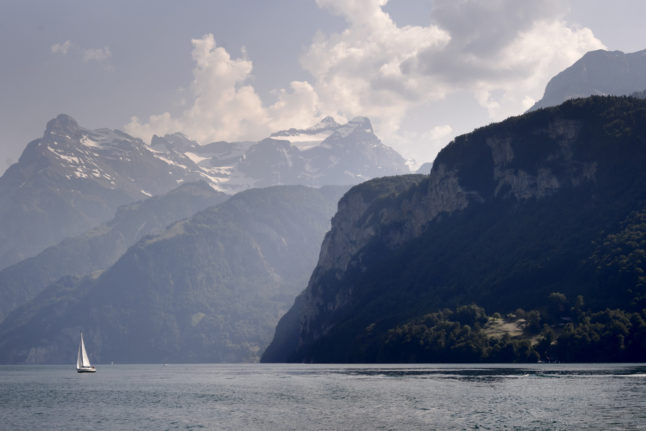Which regions in Switzerland have the best (and worst) weather?

Whether you're looking for lots of sunshine or prefer a cooler climate, Switzerland has a diverse offering when it comes to weather.
Switzerland’s climate is heavily influenced by its proximity to the Atlantic Ocean and the Alps, while its south side is affected by the Mediterranean Sea.
Needless to say, some regions will tend to feel a bit warmer than others.
According to the Federal Office of Meteorology and Climatology, MeteoSwiss, Switzerland’s average temperature across all regions was 5.8C for the years 1991-2020.
Meanwhile, the annual mean in the country’s lowlands averaged 8-12C in that time span.
North of the Alps, the highest temperatures can be found in Western Switzerland along Lake Geneva, which comprises most of French-speaking Switzerland minus Valais, as well as south of Jura and across Basel.
So, where in Switzerland can you expect the warmest weather?
Not surprisingly, those on the lookout for warm weather and plenty of sunshine should head to Switzerland’s southernmost cantons, Ticino and Valais, which tops even Western Switzerland’s scorching temperatures.
Some of Switzerland’s sunniest locations enjoy around 2,000 hours (or more) of sunshine per year and most of those regions sit within...you guessed it, Ticino and Valais.
Ticino is often hailed as a “smaller Italy” and experiences a pilgrimage of people from other Swiss areas as soon as an extended weekend break is around the corner, seeking its sun, warmth, and an ambience that is totally different from the country’s other regions,
You can read more on why the Swiss love Ticino so much here:
Why is Ticino Switzerland's favourite Easter destination?
Meanwhile, Valais overlaps with the sunny valley of the Rhône – which sees some of the highest relative sunshine duration on record - from its headwaters all the way to Lake Geneva.
Those hoping to enjoy a hike in the sun should note that the highest relative sunshine duration in Switzerland has been observed in the dry valleys of the inner Alps, such as the Rhône valley, Engadin, and the south side of the Alps.
It gets cooler in central Switzerland...
In turn, those living in the northern part of central Switzerland, which includes the cantons Lucerne, Zug, and Schwyz where low-lying stratus clouds are regularly observed in the colder months, usually see less sun throughout the year.

A boat sails on Lake Lucerne near the Rutli meadow, considered the birthplace of Switzerland. File photo: FABRICE COFFRINI / AFP
The northern part of central Switzerland and the southern part of the canton of Jura are also particularly affected by the cold, dry Bise wind during the chillier months of the year.
So, if you like to keep warm(ish), perhaps best avoid central Switzerland from October onwards.
And if you’re hoping for sun and dry weather on August 1st, the Swiss National Day, note that rain-free celebrations are not guaranteed in Switzerland even in what is the warmest time in the year.
According to MeteoSwiss, an analysis of the weather measurements between 1982-2021 shows substantial regional variation when it comes to good vs. bad weather on Switzerland’s only national public holiday.
The weather data collected over the last few decades shows that evening celebrations on August 1st were seldom rained off in the western part of central Switzerland (Obwalden, Lucerne) while rainy get-togethers were mostly observed in Eastern Switzerland and the Swiss Alps.
For instance, in the Swiss Alpine village of Adelboden in the Bernese Oberland as well as the city of Glarus, evening rain was a staple on August 1st evening festivities every other year on average.
In Ticino, however, temperatures are usually very pleasant in the summer.
In short: if you’re looking for guaranteed sunshine, stick to the south of Switzerland and more precisely, the canton of Ticino.
Comments
See Also
Switzerland’s climate is heavily influenced by its proximity to the Atlantic Ocean and the Alps, while its south side is affected by the Mediterranean Sea.
Needless to say, some regions will tend to feel a bit warmer than others.
According to the Federal Office of Meteorology and Climatology, MeteoSwiss, Switzerland’s average temperature across all regions was 5.8C for the years 1991-2020.
Meanwhile, the annual mean in the country’s lowlands averaged 8-12C in that time span.
North of the Alps, the highest temperatures can be found in Western Switzerland along Lake Geneva, which comprises most of French-speaking Switzerland minus Valais, as well as south of Jura and across Basel.
So, where in Switzerland can you expect the warmest weather?
Not surprisingly, those on the lookout for warm weather and plenty of sunshine should head to Switzerland’s southernmost cantons, Ticino and Valais, which tops even Western Switzerland’s scorching temperatures.
Some of Switzerland’s sunniest locations enjoy around 2,000 hours (or more) of sunshine per year and most of those regions sit within...you guessed it, Ticino and Valais.
Ticino is often hailed as a “smaller Italy” and experiences a pilgrimage of people from other Swiss areas as soon as an extended weekend break is around the corner, seeking its sun, warmth, and an ambience that is totally different from the country’s other regions,
You can read more on why the Swiss love Ticino so much here:
Why is Ticino Switzerland's favourite Easter destination?
Meanwhile, Valais overlaps with the sunny valley of the Rhône – which sees some of the highest relative sunshine duration on record - from its headwaters all the way to Lake Geneva.
Those hoping to enjoy a hike in the sun should note that the highest relative sunshine duration in Switzerland has been observed in the dry valleys of the inner Alps, such as the Rhône valley, Engadin, and the south side of the Alps.
It gets cooler in central Switzerland...
In turn, those living in the northern part of central Switzerland, which includes the cantons Lucerne, Zug, and Schwyz where low-lying stratus clouds are regularly observed in the colder months, usually see less sun throughout the year.

The northern part of central Switzerland and the southern part of the canton of Jura are also particularly affected by the cold, dry Bise wind during the chillier months of the year.
So, if you like to keep warm(ish), perhaps best avoid central Switzerland from October onwards.
And if you’re hoping for sun and dry weather on August 1st, the Swiss National Day, note that rain-free celebrations are not guaranteed in Switzerland even in what is the warmest time in the year.
According to MeteoSwiss, an analysis of the weather measurements between 1982-2021 shows substantial regional variation when it comes to good vs. bad weather on Switzerland’s only national public holiday.
The weather data collected over the last few decades shows that evening celebrations on August 1st were seldom rained off in the western part of central Switzerland (Obwalden, Lucerne) while rainy get-togethers were mostly observed in Eastern Switzerland and the Swiss Alps.
For instance, in the Swiss Alpine village of Adelboden in the Bernese Oberland as well as the city of Glarus, evening rain was a staple on August 1st evening festivities every other year on average.
In Ticino, however, temperatures are usually very pleasant in the summer.
In short: if you’re looking for guaranteed sunshine, stick to the south of Switzerland and more precisely, the canton of Ticino.
Join the conversation in our comments section below. Share your own views and experience and if you have a question or suggestion for our journalists then email us at [email protected].
Please keep comments civil, constructive and on topic – and make sure to read our terms of use before getting involved.
Please log in here to leave a comment.